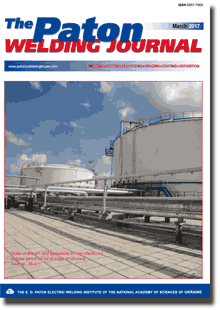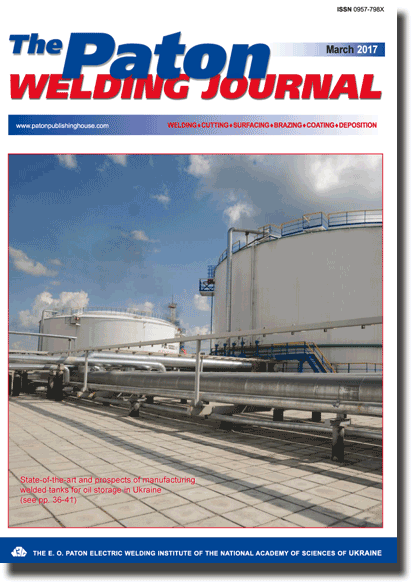| 2017 №03 (01) |
DOI of Article 10.15407/tpwj2017.03.02 |
2017 №03 (03) |

The Paton Welding Journal, 2017, #3, 7-14 pages
Modelling of temperature fields and stress-strain state of small 3D sample in its layer-by-layer forming
O.V. Makhnenko1, A.S. Milenin1, E.A. Velikoivanenko1, N.I. Pivtorak1 and D.V. Kovalchuk2
1E.O. Paton Electric Welding Institute, NASU 11 Kazimir Malevich Str., 03680, Kiev, Ukraine. E-mail: office@paton.kiev.ua
2PJSC SPE «Chervona Khvylya» 15 Kazimir Malevich Str., 03680, Kiev, Ukraine. E-mail: master@chervonahvilya.com
Abstract
A set of investigations on kinetics of temperature fields and stress-strain state of a tee section was carried out employing mathematical and computer modelling methods in order to optimize a process of layer-by-layer forming of titanium structural elements of aerospace designation by means of current xBeam 3D Metal Printer (xBeam) electron beam technologies. The results of investigations were used for temperature fields optimizing in order to provide uniform distribution on height and length of the product by selection of efficient time between deposition passes of forming beads and source alternating power. Besides, typical stress and strain fields, formed in the product during its manufacture, were shown as well as possibilities of application of processing methods for reduction of residual forming. 26 Ref., 2 Tables, 13 Figures.
Keywords: layer-by-layer forming, electron beam, temperature field, stress-strain state, optimizing, mathematical modelling
Received: 14.02.17
Published: 19.04.16
References
- Ding, D. et al. (2015) Wire-feed additive manufacturing of metal components: Technologies, developments and future interests. J. of Adv. Manufact. Technology, 81(1), 465–481. https://doi.org/10.1007/s00170-015-7077-3
- Heinl, P. et al. (2007) Cellular titanium by selective electron beam melting. Eng. Mater., 9, 360–364.
- Kristofer, Ek. (2014) Additive manufactured material: Master of Sci. Thesis, Stockholm.
- Brandl, E. et al. (2010) Additive manufactured Ti–6Al–4V using welding wire: Comparison of laser and arc beam deposition and evaluation with respect to aerospace material specifications. Physics Procedia, December, 595–606. https://doi.org/10.1016/j.phpro.2010.08.087
- Mandil, G. et al. (2016) Building new entities from existing titanium part by electron beam melting: Microstructures and mechanical properties. J. of Adv. Manufact. Technology, Vol. 85, Issue 5, 1835–1846.
- Murr, L.E. et al. (2010) Characterization of titanium aluminide alloy components fabricated by additive manufacturing using electron beam melting. Acta Materialia, Vol. 58, Issue 5, 1887–1894.
- Marin, E. et al. (2010) Characterization of cellular solids in Ti6Al4V for orthopaedic implant applications: Trabecular titanium. Behaviour of Biomedical Mater., Vol. 3, Issue 5, 373–381.
- Wahyudin P. Syam et al. (2012) Preliminary fabrication of thin-wall structure of Ti6Al4V for dental restoration by electron beam melting. Rapid Prototyping J., April, 230–240. https://doi.org/10.1108/13552541211218180
- Leonard F. et al. (2012) Assessment by X-ray CT of the effects of geometry and build direction on defects in titanium ALM parts. In: of Conf. on Industrial Computed Tomography (ICT), 85–93.
- Golkovski, M.G. et al. (2013) Atmospheric electron-beam surface alloying of titanium with tantalum. Sci. & Engineering, A, Vol. 578, 310–317. https://doi.org/10.1016/j.msea.2013.04.103
- Yan Ma et al. (2015) Effect of interpass temperature on in-situ alloying and additive manufacturing of titanium aluminides using gas tungsten arc welding. Manufacturing, 8, 71–77. https://doi.org/10.1016/j.addma.2015.08.001
- Blanka A. Szost et al. (2015) A comparative study of additive manufracturing techniques: Residual stress and microstructural analysis of CLAD and WAAM printed Ti–6Al–4V components. Materials and Design, Vol. 89, 559–567. https://doi.org/10.1016/j.matdes.2015.09.115
- Baurfeld, B. et al. (2010) Additive manufacturing of Ti-6Al-4V components by shaped metal deposition: Microstructure and mechanical properties. Materials and Design, Vol. 31, 106–111. https://doi.org/10.1016/j.matdes.2009.11.032
- Edwards, P. et al. (2013) Electron beam additive manufacturing of titanium components: Properties and performance. of Manufact. Sci. and Engineering, Vol. 135, Issue 6, 061016/1–061016/7.
- Gong, X. et al. (2013) Powder-bed electron-beam-melting additive manufacturing: Powder characterization, process simulation and metrology. ASME Early Career Techn. J., 12, 59–66.
- Nai, M.L.S. et al. (2016) Recent progress of additive manufactured Ti-6Al-4V by electron beam melting. In: of 27th Annual Int. Solid Freeform Fabrication Symp. — An Additive Manufacturing Conf., 691–704.
- Petrovic, V. et al. (2012) Additive manufacturing solutions for improved medical implants. Biomedicine, InTechOpen, March, 147–180. https://doi.org/10.5772/38349
- Jia, Lv et al. (2015) Electron beam melting fabrication of porous Ti6Al4V scaffolds: Cytocompatibility and osteogenesis. Eng. Mater., 1–8.
- Mari Koike et al. (2011) Evaluation of titanium alloys fabricated using rapid prototyping technologies — electron beam melting and laser beam melting. Materials, 4, 1776–1792. https://doi.org/10.3390/ma4101776
- Akhonin, S.V., Vrzhizhevsky, E.L., Belous, V.Yu. et al. (2016) Electron beam 3D-deposition of titanium parts. The Paton Welding J., 5/6, 130–133. https://doi.org/10.15407/tpwj2016.06.22
- Makhnenko, V.I. (2013) Problems of examination of modern critical welded structures. Ibid., 5, 21–28.
- Makhnenko, V.I., Velikoivanenko, E.A., Olejnik, O.I. (2008) Risk analysis as a method for formalizing decision making on unscheduled repair of welded structures. Ibid., 5, 2–7.
- Milenin, O.S. (2011) Probabilistic analysis of state of main pipelines with revealed defects and their service life after repair under pressure. Visnyk Ternopil NTU, Special Issue, Pt 1, 73–81.
- Makhnenko, V.I. (1976) Computational methods of investigation of welding stress and strain kinetics. Kiev: Naukova Dumka.
- Makhnenko, V.I. (2006) Safety service life of welded joints and assemblies of modern structures.
- Velikoivanenko, E.A. et al. (2014) Methods and technologies of parallel calculations for mathematical modeling of stress-strain state of structures taking into account ductile fracture. Upravleniya i Informatiki, 6, 42–52.
Suggested Citation
O.V. Makhnenko, A.S. Milenin, E.A. Velikoivanenko, N.I. Pivtorak and D.V. Kovalchuk (2017) Modelling of temperature fields and stress-strain state of small 3D sample in its layer-by-layer forming. The Paton Welding J., 03, 7-14.The cost of subscription/purchase order journals or individual articles
| Journal/Currency | Annual Set | 1 issue printed |
1 issue |
one article |
| TPWJ/USD | 384 $ | 32 $ | 26 $ | 13 $ |
| TPWJ/EUR | 348 € | 29 € | 24 € | 12 € |
| TPWJ/UAH | 7200 UAH | 600 UAH | 600 UAH | 280 UAH |
| AS/UAH | 1800 UAH | 300 UAH | 300 UAH | 150 UAH |
| AS/USD | 192 $ | 32 $ | 26 $ | 13 $ |
| AS/EUR | 180 € | 30 € | 25 € | 12 € |
| SEM/UAH | 1200 UAH | 300 UAH | 300 UAH | 150 UAH |
| SEM/USD | 128 $ | 32 $ | 26 $ | 13 $ |
| SEM/EUR | 120 € | 30 € | 25 € | 12 € |
| TDNK/UAH | 1200 UAH | 300 UAH | 300 UAH | 150 UAH |
| TDNK/USD | 128 $ | 32 $ | 26 $ | 13 $ |
| TDNK/EUR | 120 € | 30 € | 25 € | 15 € |
AS = «Automatic Welding» - 6 issues per year;
TPWJ = «PATON WELDING JOURNAL» - 12 issues per year;
SEM = «Electrometallurgy Today» - 4 issues per year;
TDNK = «Technical Diagnostics and Non-Destructive Testing» - 4 issues per year.


